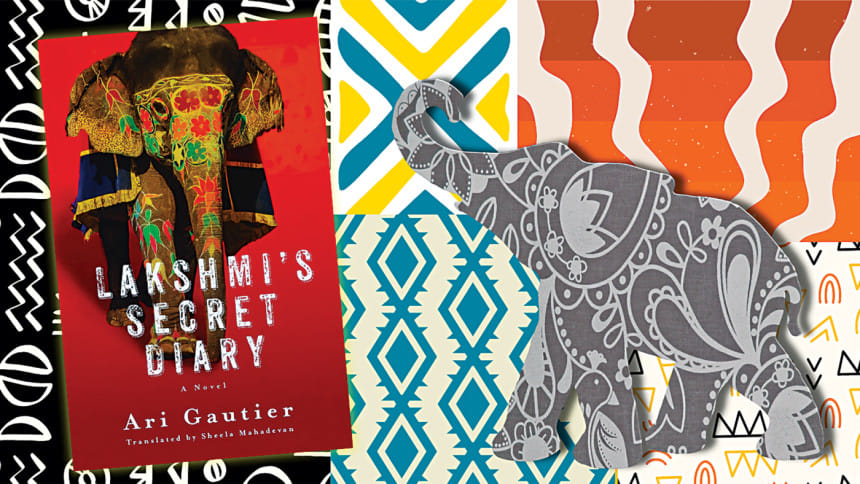When the moon dances with elephants

In Lakshmi's Secret Diary, Ari Gautier crafts a dazzling, multi-layered narrative that is as whimsical as it is profound. Translated with lyrical grace by Sheela Mahadevan, this South Asian francophone novel reimagines the traditional animal fable, inviting readers into a surreal and poignant odyssey through the eyes of Lakshmi, a temple elephant yearning for freedom.
Set in the richly textured landscape of Pondicherry, once the colonial heart of French India, Lakshmi's Secret Diary interweaves myth, satire, and philosophical inquiry into a compelling critique of South Asian society. At the heart of the novel lies a deceptively simple premise—an elephant escapes captivity. Yet Lakshmi's journey quickly expands into a kaleidoscopic exploration of identity, oppression, and transcendence.
Rendered with remarkable sensitivity by Mahadevan, Gautier's prose balances the surreal and the satirical, conjuring a world where animals voice existential dilemmas and the moon dances with elephants. The story's cast is as imaginative as it is allegorical- Tripod Dog Baba, a three-legged sage; a flying fish named Alphonse; and a chameleon grappling with questions of being. Each encounter adds dimension to Lakshmi's awakening, revealing both the absurdity and cruelty of hierarchical structures, from caste to speciesism.
One of the novel's greatest strengths is its ability to toggle between the comic and the tragic without losing emotional depth. Gautier writes with a deep awareness of how animals are entangled in the spiritual and social fabric of India, simultaneously venerated, and violated, divine and disposable.
Beneath the fantastical veneer lies a trenchant social critique. Gautier does not shy away from exposing the contradictions of Indian society, particularly the caste system and its enduring legacy of violence and marginalisation. Yet his critique is couched in empathy, guided by the moral compass of his nonhuman narrators who, through their estrangement from the human world, offer fresh eyes on old injustices.
The novel also serves as an important intervention in South Asian literary discourse. As one of the few contemporary Indian writers working in French, Gautier challenges linguistic hierarchies and expands the terrain of South Asian postcolonial literature. Mahadevan's afterword enriches the reading experience, situating the novel within broader conversations about reincarnation, translation, and Francophone literary traditions.
Lakshmi's Secret Diary emerges as a highly relevant and timely work within multiple contemporary literary, cultural, and political contexts, both within India and in broader global discourses. Its significance lies not only in its themes and form but also in its linguistic and cultural positioning as a Francophone South Asian novel, a rare contribution to postcolonial literature.
Gautier blends Sanskrit mythology, magical realism, and philosophical musing in a way that reflects the fragmented, surreal nature of modern life. The dancing moon, the existential chameleon, and the flying fish are not merely whimsical touches. They reflect a reality in which the mystical, the absurd, and the political coexist. This narrative style resonates in a world
As a novel originally written in French by a South Asian author from the former French colony of Pondicherry, Lakshmi's Secret Diary complicates the dominant Anglophone and regional language narratives in South Asian literature. It highlights the overlooked legacy of French colonialism in India, a history often eclipsed by the British Raj in public memory and literary production. Gautier uses this linguistic hybridity to explore layered colonial inheritances and question dominant cultural narratives.
By narrating the story through the eyes of Lakshmi, a temple elephant, and her animal companions, Gautier offers a fresh, defamiliarised perspective on human society. This device powerfully critiques caste hierarchies, religious hypocrisy, and speciesism, issues deeply ingrained in South Asian society.
In an era of increasing concern for animal rights, climate change, and inter-species ethics, the novel's exploration of animal consciousness and captivity feels especially prescient. It challenges anthropocentric worldviews and invites readers to reconsider the porous boundaries between species and the moral consequences of human dominion.
Themes of freedom, fate, and self-determination are woven throughout the novel, resonating with contemporary struggles for autonomy and dignity, whether in relation to caste, gender, colonial legacies, or even ecological survival. Lakshmi's quest is as much internal as it is geographical. Her existential search echoes broader human concerns around purpose, memory, and liberation.
Gautier blends Sanskrit mythology, magical realism, and philosophical musing in a way that reflects the fragmented, surreal nature of modern life. The dancing moon, the existential chameleon, and the flying fish are not merely whimsical touches. They reflect a reality in which the mystical, the absurd, and the political coexist. This narrative style resonates in a world where traditional belief systems and rapid modernisation clash, and where storytelling becomes a means of making sense of cultural dislocation.
Finally, the novel's form, fusing fable, satire, magical realism, and philosophical fiction, contributes to its relevance. It resists categorisation, much like the complex identities of its characters and the city it inhabits. For readers and scholars alike, Lakshmi's Secret Diary expands the possibilities of what a South Asian novel can be, not just a realist portrait, but a deeply imaginative, subversive, and multilingual expression of contemporary life.
Lakshmi's Secret Diary is a rare and remarkable achievement, a work that is at once poetic, political, whimsical, and weighty. It reminds us that stories told through the eyes of animals can often reveal more about human nature than those told by humans themselves. Through Lakshmi's unforgettable journey, Gautier and Mahadevan offer a testament to the enduring power of storytelling to reimagine the world and to imagine freedom in its most expansive sense.
Namrata is the founder of Keemiya Creatives and Bookbots India, and editor of Kitaab. She hosts The Bookbot Theory podcast and writes on travel, gender, and culture.

 For all latest news, follow The Daily Star's Google News channel.
For all latest news, follow The Daily Star's Google News channel. 



Comments